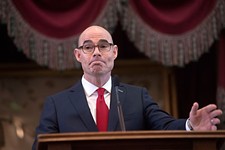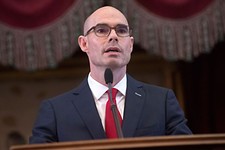The Good, the Bad, and the Ugly of the Upcoming Legislative Session
Lawmakers set to tackle immigration, education, legalization, transportation, and more
By the News Staff, Fri., Dec. 14, 2018
Yes, they're coming back. Yes, they have to. Will the 86th Texas Legislature be as horrific and hostile as its recent predecessors, or will it be a more pleasant and welcoming place? There's evidence pointing toward both. The GOP is still in charge and itching to finally score right-wing scalps that it's failed to grab in past sessions, and the biggest single obstacle to their progress – House Speaker Joe Straus – has left the building. On the other hand, many state leaders had quite the scare this past election, and Team Blue flipped 12 seats in the House and two in the Senate, perhaps – we hope? – growing the Not-Insane Caucus further toward a working majority. Here's what we're watching for on key issues in the lead-up to the first day of the session, Tuesday, January 8.
The State Budget and Taxes
Going into the 86th Legislature, the Texas budget forecast once again reflects the state's new normal – yes, there's more money, but we've kind of already spent it, so don't go crazy. That's been the guidance from Comptroller Glenn Hegar, who increased his revenue estimate by nearly $3 billion in July while highlighting economic uncertainty going forward, and the Legislative Budget Board, which told state agencies not to ask for more money even though we know some will surely need it. On top of the usual health care shell game (where we postpone liabilities we're incurring this biennium) and the bills still due from Hurricane Harvey, the Lege will be under pressure to invest more in public education (and special ed in particular) and substance abuse treatment while covering inflation and population growth.
On the right side of the aisle, folks like the Texas Public Policy Foundation think inflation and population growth is all we should spend money on, but even their "Conservative Texas Budget" guidelines allow for an 8% increase in the new biennium. That modicum of "new money" has helped grease the skids for yet another crusade for property tax evasion – sorry, "relief" – for GOP suburbanites – sorry, "Texans." A proposed 2.5% annual cap on revenue increases by local taxing jurisdictions, left on the cutting-room floor in the House last session, is coming back with Gov. Greg Abbott's full support and more stringent requirements for busting that cap in a rollback or tax ratification election. Local leaders at City Hall, Commissioners Court, AISD, Central Health, and elsewhere have been preparing with dread for the impact this could have on local budgets. – Mike Clark-Madison
Fixing School Finance
Forces are converging in a way that may finally produce badly needed reform to the state's school finance system. Gov. Abbott's office has been privately hashing out a plan that it says would create more funding for schools and lower property taxes for Texans. Rep. Dennis Bonnen, R-Angleton, the presumptive new speaker of the House, has said fixing the public school system is a top priority for the 86th Legislature, as have some senators, and a commission of school leaders and legislators has been working all year to develop recommendations on how the state can grow revenues to fund schools.
Stalwarts such as Rep. Donna Howard, D-Austin, and newcomers such as Rep. James Talarico, D-Round Rock, are eager to take another crack at finding meaningful, long-term school funding solutions. Howard is feeling optimistic, telling us the midterm – in which 12 red House seats were flipped blue by candidates, including Talarico, running on pro-education platforms – should be a "wake-up call" for resistant GOP lawmakers. "Educators came out in force during the election, which should encourage a move more toward the middle," Howard said.
Abbott's proposal to increase the state's financial contribution to schools while reducing local districts' property tax burdens doesn't yet explain how the lost local revenue would be replaced by other sources. When The Texas Tribune published Abbott's draft plan in November, the governor caught flak from members of the school finance commission who saw it as an attempt to push tax caps in disguise.
The scourge of school finance reform, Lt. Gov. Dan Patrick, remains a wild card. Last session, the House passed a bill to enact needed changes to the finance system, but the Patrick-led Senate floundered when it tried to adopt its own proposal. While Patrick has remained relatively quiet, Senate leaders such as Lois Kolkhorst, R-Brenham, have signaled support for education fixes this session.
Balancing property tax reduction (which the GOP wants) with increased school funding will test lawmakers all session; for both to happen, they will have to cut money elsewhere, divert from the Economic Stabilization Fund (the "rainy day fund"), or raise other taxes. Howard says she and her Dem colleagues are open to all solutions, but need to build coalitions with moderate Republicans to make progress this session. – Austin Sanders
Taking Aim at Local Control
As they've snuffed out housing remedies, rideshare regulations, environmental protections, and other good ideas in the past, GOP legislators aim to put the kibosh on progressive policies adopted by Austin and other cities since they last wrapped up in 2017. Paid sick leave, as Austin and San Antonio guaranteed to all workers earlier this year, has a big bull's-eye on its back; Rep. Matt Krause, R-Fort Worth, dropped House Bill 222 on the first day of bill filing to undo the pro-labor measures.
And Rep. James White, R-Woodville, brings us HB 135 to prohibit local bans on "working animals," specifically those in the "entertainment, transportation, education, or exhibition" businesses. Like ... circus elephants, which are already going out of style (Ringling Bros. put its elephants out to pasture in 2016). Though no measure has been filed yet, it also wouldn't be surprising to see the Lege take aim at Austin Energy, though the utility's longtime nemesis Sen. Troy Fraser has now retired. – Nina Hernandez
Immigration, Good and Bad
In last session's most explosive moment, Rep. Matt Rinaldi, R-Irving, called U.S. Immigration and Customs Enforcement on Latino protesters who had flooded the House gallery to oppose one of the harshest anti-immigrant laws in the country, Senate Bill 4. "I called ICE – fuck them," he reportedly told a group of Democratic lawmakers. That hateful act on the last day of the session may have factored into Rinaldi's defeat in November, but SB 4 is still law and Attorney General Ken Paxton has already sued San Antonio for violating its anti-"sanctuary city" provisions.
And the GOP isn't yet done diminishing immigrant rights. Already in the hopper is HB 413 by Freedom Caucus member Rep. Kyle Biedermann, R-Fredericksburg, this year's attempt to end in-state tuition for undocumented college students. The 2001 Texas Dream Act, which passed with broad bipartisan support, hamstrung then-Gov. Rick Perry's later runs for president, and Trumpian sentiment could push Biedermann's repeal bill across the finish line. On the flip side, Sen. José R. Rodríguez, D-El Paso, has filed to protect the immigrant community and chip away at SB 4 restrictions. – Mary Tuma
Vigilance on LGBTQ Freedoms
When it comes to LGBTQ rights, the 2019 Lege session is already getting mixed reviews. For months, advocates and queer rights lobbyists have forewarned: If you thought 2017 – with its anti-trans bathroom bills and nearly two dozen religious liberty bills – was bad, 2019 is going to be worse. No bills directly attacking the LGBTQ community have been filed to date, but Austin Democratic precinct chair and LGBTQ policy expert Ash Hall noted that most controversial bills are typically filed later in the session. Both Equality Texas' Chuck Smith and Out Youth's Kathryn Gonzales expect to see fewer standalone anti-LGBTQ bills filed, but predict amendments being tacked onto must-pass legislation such as school finance. Smith expects to see some more potty-police efforts targeting trans and queer youth, as well as more religious-refusal laws, which he describes as a "license to discriminate." Advocates also anticipate efforts to pre-empt local control that could revoke or nullify current and future nondiscrimination ordinances.
On the flip side, a handful of bills have been filed to support queer and trans Texans, such as omnibus bills HB 244 (by Rep. Jessica Farrar), HB 254 (Rep. Diego Bernal), and SB 151 (Senators José Rodríguez, John Whitmire, and Juan "Chuy" Hinojosa) to protect sexual orientation, gender identity, and gender expression from discrimination in labor, housing, employment, and public accommodation. Rodríguez has also filed SB 154 to streamline the name and gender change process, which Hall noted would be a "great benefit" to the trans community. – Sarah Marloff
Health Care For All Texans?
In a state with the highest rate of uninsured residents in the country – a stunning 17%, nearly double the national average – and a dire maternal mortality crisis, increasing health care access should be a top priority for the 86th Legislature, but of course isn't. Since the passage of the Affordable Care Act, Democrats have clamored to expand Medicaid and provide coverage for an additional 1.1 million low-income Texans. Instead, Attorney General Ken Paxton is leading 19 other states on a legal crusade to overturn the ACA, now with the blessing of the Trump administration.
But progressives aren't giving up hope. Rep. Carol Alvarado, D-Houston, has proposed HB 282, to allow counties to expand Medicaid for certain residents, and Sen. José Rodríguez, D-El Paso, hopes to cement patient health plan protections, including barring denial due to pre-existing conditions, with SB 145. And Rep. Gina Hinojosa, D-Austin, plans to carry the Healthy Texas Act of 2019 to provide Texans with comprehensive health care services – a sweeping bill inspired by the national Medicare for All plan. ("Dems Call for Health Care for All Texans," Dec. 7). Democratic legislators also plan attempts to allay the opioid epidemic; fight against the anti-vaxxer camp; widen mental health care coverage; expand women's health access to reduce maternal mortality; and, of course, combat the inevitable slew of anti-abortion laws this session ("A Peek Into the New Lege's Anti-Choice Plan," Nov. 23). – M.T.
Giving Workers a Fair Shot
"We're going to be focusing on a 'Fair Shot Agenda,'" said Rick Levy, "based on the radical notion that government should actually work in the interest of the people it represents." The Texas AFL-CIO president said that agenda includes both specific labor issues and broader social priorities: raising the minimum wage; protecting retirement security (i.e., pensions); defending unions' ability to collect dues; expanding Medicaid and making health care more affordable for public employees; allowing local governments to raise workplace wage and safety standards – in sum, "focusing on what the state can do to assist people to earn a decent living."
The "fair shot" also includes "sane" immigration policies, full funding for public education and "defeat of vouchers," and defending voting rights. During recent GOP-dominated sessions, labor advocacy has been largely devoted to "defense" against right-wing assaults on workers' rights. "Defense remains number one," Levy said. "But the midterm election results said to us that there's a huge appetite for solutions and policies that address people's basic needs."
Other labor advocates echoed Levy's to-do list – one noted that the Rainy Day Fund (currently at $12.5 billion) could be tapped to address public education funding. "Full funding" of public education was a refrain in pre-session conversations, while Gov. Abbott is promoting draconian property tax caps. Austin AFSCME spokesman Jack Kirfman reiterated, "We don't want to see these revenue caps on cities and school districts."
"We're going to watch how [legislators] respond on these issues," concluded Levy, "and that will become the basis for the elections in 2020. Who stands with the people, and who doesn't?" – Michael King
Criminal Justice: Both Sides Agree
Bipartisanship is so stunted in America that Congress can't get its act together to skirt mandatory minimums for low-level offenders with no criminal histories, even though both parties and the president all want it. But in Texas, if there's anything the two parties can agree on, it's some old-fashioned criminal justice.
There's a sense that some compromise can be reached on repealing the driver responsibility program, the penalty scheme that sucks up surcharges on traffic penalties and redistributes them for trauma care ("How to Jail the Poor," Sept. 21). Members from both parties have already filed repeal bills, only differing in how to raise the replacement funds. Similarly, lawmakers on both ends want an end to certain cash bail practices, to limit crowding in the jails and the courts, and to de-emphasize plea deals as the best means of getting free. Senate Criminal Justice Committee Chair John Whitmire, D-Houston, has suggested reprising last session's SB 1338, to create a risk assessment system to measure whether someone should be granted bond on personal recognizance; it passed the Senate in 2017 but died in the House. Similar approaches are already coming online locally; Travis County saw the creation of a state jail court to process low-level felonies, and a bond reduction docket to address a rash of plea deals. That could bring increased urgency to the issue in both chambers.
Elsewhere, there's an ongoing push to address issues affecting women in prison – corrections standards, overcrowding, a lack of education offerings and support, both during and after incarceration. The conservative Texas Public Policy Foundation has also signaled support for reforming civil asset forfeiture and addressing transparency, training, and deployment challenges for SWAT teams.
Rep. Harold Dutton, D-Houston, has (for the ninth session in a row) filed a bill to abolish the death penalty, as well as a measure to try 17-year-olds as juveniles. McAllen Democratic Sen. Juan "Chuy" Hinojosa's SB 130 would eliminate forensic hypnosis as courtroom evidence; Sen. Borris Miles, D-Houston, seeks an independent oversight system for state prisons; and Rep. Chris Turner, D-Grand Prairie, wants a commission to study how intellectual and developmental disability is determined in death penalty cases. – Chase Hoffberger
Environment: Hopeful Signs
The Lone Star Chapter of the Sierra Club has a legislative priority list covering a lot of environmental ground: post-Harvey rebuild, clean air, clean energy solutions, safe radioactive waste management, defending local control, better oversight of oil and gas operations, adequate funding for public resources, and water conservation and management.
Conservation Director Cyrus Reed provides more detail. "There's a lot of interest in continuing to fund TERP [Texas Emissions Reduction Plan], which targets mobile sources of emissions, to reduce smog. The fees that support it [vehicle title registration, etc.] run out in 2019, and there's bipartisan support to continue it," Reed said. "Another issue is that the funds – currently $1.7 billion in that account – are never fully allocated, instead used to balance the budget on paper."
Hurricane Harvey highlighted the need for better coastal management, including protecting petrochemical storage tanks and oil and gas wells against floods and storms. There's renewed concern that the nuclear industry will be pushing to expand radioactive waste deposits in far West Texas – more low-level waste, and perhaps high-level waste as well, all transported on state highways. Advocates also fear another major "pre-emption" bill like HB 40 (the 2015 law that banned local regulation of fracking) to upend local environmental ordinances. The Texas Public Policy Foundation has launched an effort to undermine support for renewable energy – a similar effort, funded by fossil fuel interests, largely succeeded in Oklahoma.
There are a few hopeful signs. Public Citizen's Adrian Shelley says Democratic gains should make the session "closer to centrist" and even persuade some Republican reps to be more responsive to environmental concerns. Former PC director Tom "Smitty" Smith – now executive director of the Texas Electric Transportation Resources Alliance (TxETRA) – says falling prices and moves by major car companies portend a good future for electric vehicles. "For this session, we need to adjust policies to make sure we don't overload the grid, and enable accessory, overnight energy." All-electric vehicles could enable cities to reduce pollution, and come into compliance with the federal Clean Air Act. – M.K.
Smooth Ride for Transportation
After property tax evasion, highway funding has always been a good way for the Texas GOP to keep the suburbs happy, and with the passage of statewide Propositions 1 and 7 in 2014 and 2015 – schemes to keep the state funding tank full without raising the gas tax – transportation has become a much mellower issue at the Capitol than it was 10 years ago. Former House Transportation Chair Joe Pickett, D-El Paso, has filed a measure to tweak the Prop 7 funding formulas; in the Senate, Transportation Vice Chair Bob Hall, R-Edgewood, has a proposal for a pilot project to, in effect, create tax-increment financing specifically for a (as yet unidentified) highway project. And, of course, lingering Freedom Caucus die-hards like Matt Shaheen, R-Plano, aim to hasten the demise of tolling, even as other parts of the state such as South Texas seek to create new tolling authorities.
Away from the funding lane, bills addressing registration, inspection, and liability insurance for robot cars have already been filed, with more expected as the need for autonomous vehicle regulation becomes more pressing. The same may be true for dockless mobility; though the justification for the state taking over ride-hailing regulation – that Uber and Lyft trips can cross city limits easily – isn't there for scooters et al., the same companies and their money are still present.
Hall is also carrying measures to limit or prohibit the use of red-light and speed-zone cameras and of the data being generated by them, toll-tag readers, and roadside sensors. Meanwhile, Rep. Ramon Romero Jr., D-Fort Worth, is carrying a bill to create a conditional driver's license that does not require proof of citizenship, a safety measure that has failed before for all the usual reasons. Rep. Celia Israel, D-Austin, will again try to help transit providers, so often ignored at the Capitol, by allowing buses to use the shoulder on gridlocked highways. – M.C.M.
Sustaining Foster Care Progress
While great strides were made in 2017 to improve conditions in the state foster care system, Lee Nichols of the statewide advocacy group TexProtects confirms the work is far from over. For the 86th, TexProtects has prevention-based priorities to lessen Child Protective Services' caseload by keeping kids out of foster care. One is to increase cash flow into community child abuse prevention programs; specifically, TexProtects is seeking $5.5 million for the Nurse-Family Partnership, and another $9.4 million for Healthy Outcomes Through Prevention and Early Support.
A second priority is a statewide plan to address causes and symptoms of childhood trauma, including cross-system collaboration, prevention and treatment training, and trauma-informed intervention and recovery efforts. The final major priority deals with the federal Family First Prevention Services Act, which funnels federal funds toward intervention and prevention in an effort to keep kids with their families.
To handle this new cash flow, Texas needs new infrastructure – starting with a strategic plan to maximize federal funds. Most of these priorities are appropriations requests, but at least 10 bills have already been filed to increase foster care support in line with these goals. And HB 53 by Rep. Ina Minjarez, D-San Antonio, would improve services and training offered by transitional living programs for youth aging out of foster care. – S.M.
Making Peace With Marijuana
Texas is moving closer to finally legalizing the medical use of cannabis. The Compassionate Use Act passed in 2015 only applies to patients with a specific form of epilepsy called intractable epilepsy – which is when seizures can't be controlled by medication – but advocates have been working ever since to give physicians more discretion to use marijuana to treat more conditions for more people, such as cancer patients and veterans suffering post-traumatic stress disorder. For the 86th, Sen. José Menéndez, D-San Antonio, has filed SB 90, which would give doctors leeway to treat cannabis as "any other medicine." Texans for Responsible Marijuana Policy Director Heather Fazio says to expect similar legislation from Rep. Eddie Lucio III, D-Brownsville. Passage would make Texas the 33rd medi-mari state; Fazio notes the urgency to make something happen for patients who need relief now, not in two years.
Outside the medical arena, there's also cause for optimism. Back in October, Gov. Greg Abbott signaled he'd be willing to endorse decriminalizing possession of small amounts of what state statute still calls "marihuana." The Republican Party of Texas also endorsed decriminalization, along with expanding the Compassionate Use Act, in its platform this summer; so far, though, it's only Democrats who've filed bills to make possession of one ounce or less a class C misdemeanor or civil offense. – N.H.
Got something to say on the subject? Send a letter to the editor.























